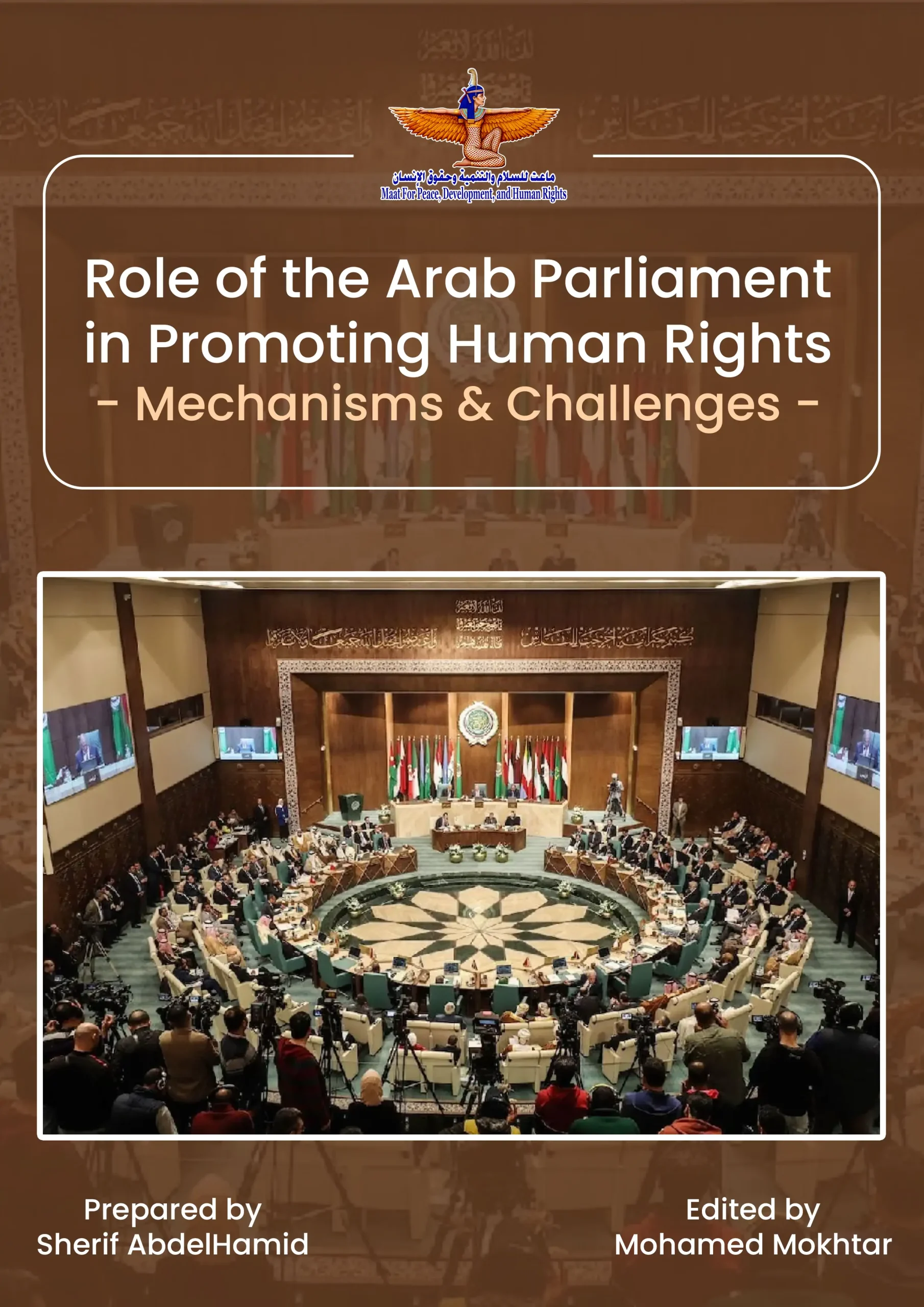Okeil: We recommend establishing a serious dialogue and principles guaranteeing the participation of civil society in the Arab Parliament-related work
Sherif Abdel Hamid: We recommend conducting a real review of the role of the Arab Observatory for Human Rights and its working mechanisms
Muhammad Mukhtar: We need an action plan to implement the ideas and visions presented in the Arab Charter on Human Rights
On the occasion of the International Day of Parliamentary Work, which falls on June 30 of each year, with the aim to review the progress made in achieving some of the key goals aimed at making parliaments more representative of people’s sects and more capable to keep pace with changes, Maat for Peace, Development and Human Rights issued a new study entitled “Role of Arab Parliament in Promoting Human Rights.. Mechanisms & Challenges”, to shed light on the ways in which the Arab Parliament, in its capacity as the representative body of the League of Arab States (LAS), contributes to the promotion and protection of human rights throughout the Arab countries.
The study addressed the Arab Parliament mechanisms and tools related to human rights implementation, the efficiency and effectiveness of the Arab Parliament in promoting and protecting human rights, the participation of stakeholders in the work of the Arab Parliament, as well as transparency and availability of information on the work of the Arab Parliament in promoting human rights. All this in addition to the effectiveness of complaints and requests mechanisms within the Arab Parliament, through a comprehensive assessment of the performance of the Arab Parliament based on a set of international human rights standards related to the evaluation of the work of parliament, including the standards of the Inter-Parliamentary Union (IPU) and the standards of the High Commissioner for Human Rights implicitly mentioned in the draft principles on parliaments and human rights, topped by performance effectiveness and efficiency, citizens’ access to information, stakeholders participation in various activities, as well as interaction and response to citizens’ needs, including interaction with human rights complaints submitted by them, with the aim of improving the human rights status of all segments of Arab society.
Commenting on the study, Ayman Okeil, an international expert and Chairperson of Maat for Peace, Development and Human Rights, stated that the internal system of the Arab Parliament necessitates the need to communicate with all stakeholders, including CSOs, to take their different opinions in the guiding laws it issues. Nevertheless, there are no specific guidelines adopted by Parliament clarifying how community organizations participate in their work related to the issuance of laws, especially those related to the status of human rights. Okeil stressed that despite the parliament's use of some stakeholders for discussion and exchange of views when approving unified laws, CSOs’ representation remains absent and weak.
The human rights expert recommended the Arab Parliament to establish a serious and time-bound dialogue with CSOs, members of the Arab Parliament, and human rights activists on the role it should play to promote and protect human rights, and formulate amendments that ensure full access to that role, provided that it includes participation of Arab citizens through various electronic forums to increase consensus in addition to setting guidelines to ensure the participation of CSOs in all work related to the Arab Parliament, through mechanisms that guarantee their effective participation, and ensure transparency in dealings between the two parties.
Sherif Abdel Hamid, Director of the International Mechanisms Unit at the Maat, explained the importance of presenting transparent information on the performance of the Arab Parliament, as well as the need to make all information related to the reports preparation process accessible, and the various guiding laws in its various stages, especially those that the Arab Parliament is currently discussing. Mukhtar also recommended the need to review the role of the Arab Observatory for Human Rights and its working mechanisms, through a joint committee consisting of representatives of the Arab Parliament and law enforcement bodies and agencies in the Arab countries, with the aim of activating the role of the Observatory in accordance with strong human rights tools.
For his part, Muhammad Mukhtar, Deputy Director of the Democracy Support Unit at Maat, indicated that CSOs should study international experiences and successful regional human rights mechanisms, which can be adopted to enhance the process of reforming the human rights system of the Arab Parliament in addition to the need to put clear mechanisms and an action plan to implement the ideas and visions contained in the "Arab Charter on Human Rights 2020: 2030", which was issued by the Arab Parliament in June 2020.

 |
 |











